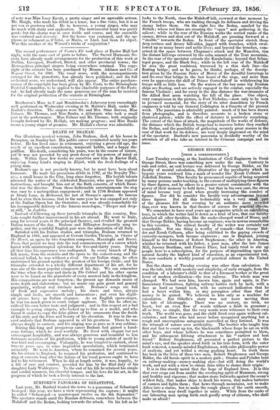GEORGE BIDDER.
[FROM A CORRESPONDENT.]
Last Tuesday evening, at the Institution of Civil Engineers in Great George Street, there was something new under the sun. Contrary to rule and order, an oral lecture was delivered by George Bidder, on the faculty of mental calculation, illustrative of the peculiarity Which in bygone years rendered him a mark of wonder like Xerah Colburn and Jedediah Buxton. This faculty he pronounced capable of being acquired by many persons under teaching, to the extent of multiplying three-figures by three figures, and by others to a greater extent consistently with the power of their memory to hold facts ; but that in his own case, the stress of mind became very great when greatly increasing the number of figures. Nor did he consider the faculty very advantageous beyond three figures. But all this technicality waa a very small part of the pleasure felt that evening by an audiente more crowded than ever was known in that theatre of science for practical objepts. We remember to have read years ago a magazine article on caleidaling boys, in which the writer laid it down as a kind of law, that one feehlty absorbed all other faculties, like the snake-changed wand of Moses, and that George Bidder, having become an engineer, was in nowise remarkable in this vocation. The critical faculty of the writer was certainly not remarkable. But one thing is worthy of remark—that George Bid- der and Xerah Colburn, after being exhibited to the gaping crowds of curiosity-mongers, both became engineers ; one in England, joining himself to the fortunes of Robert Stephenson ; the other in America, whither he returned with his father, a poor man, after the late James Mill, Jeremy Bentham, and Francis Place, had vainly tried to stir up people here to a subscription for the purpose of anperadding upon the
natural faculty the highest lion, of education as an experimental test. He now conducts a weekly journal of practical science in the United States.
But the charm of Tuesday evening was other than calculation. It was the tale, told with modesty and simplicity, of early struggle, from the condition of a labourer's child to that of a foremost worker at the great lever of modern civilization—the iron railway. The whole man was changed. We had seen him, known him, again and again, in Par- liamentary Committees, fighting railway battles inch by inch, with' a face as hard as tunnel rock, with no outward indication that he had a heart within him, or any perception other than that of money to be gained. We believed in him only as a machine for calculation. But Othello's story was not more moving than his tale of lifestruggle. There was no oratory, no trick, no boast, but an even flow of words without a fault in grammar ; all so true, so simple, that the very words were witnesses to their own truth. The world was gone, and the child lived over again without cal- culation; and those who had never before recognized anything but a rough and unscrupulous antagonist marvelled as they listened. It was the triumph of nature over artificiality. The brother who taught him first and last to count up ten, the blacksmith whose forge he sat on with other boys, and whose bellows he was sometimes permitted to blow, and his subsequent lifelong attachment to his earliest and best friend" Robert Stephenson, all presented a perfect picture to the mind's eye, and the speaker stood forth in his true form, with the outer husk removed, a manly-minded Englishman with calm philosophic power of analysis, and yet withal a strong gushing heart. In truth there has been in the lives of these two men, Robert Stephenson and George Bidder, the old heroic spirit in a modern garb - Orestes and Pylades bent on railway-making—money-making also—but still doing the world's work, and not with a view to obtain false titles to shame their origin:
It is in this sturdy metal that the hope of England lives. It is this that ever crops out from amidst the overlaying spirit of Mammon, strong and healthy and vigorous ; that makes stone bulwarks against the ocean's wildest fury, that makes ships to Mock his waves, that makes batteries of cannon and fights them ; that hews through mountains, not to make Athos into a statue, but to make the rough places of the earth smooth, that brethren may dwell together in unity. While from the ranks of our labouring men spring forth such goodly array of citizens, who shall make us afraid ?


























 Previous page
Previous page